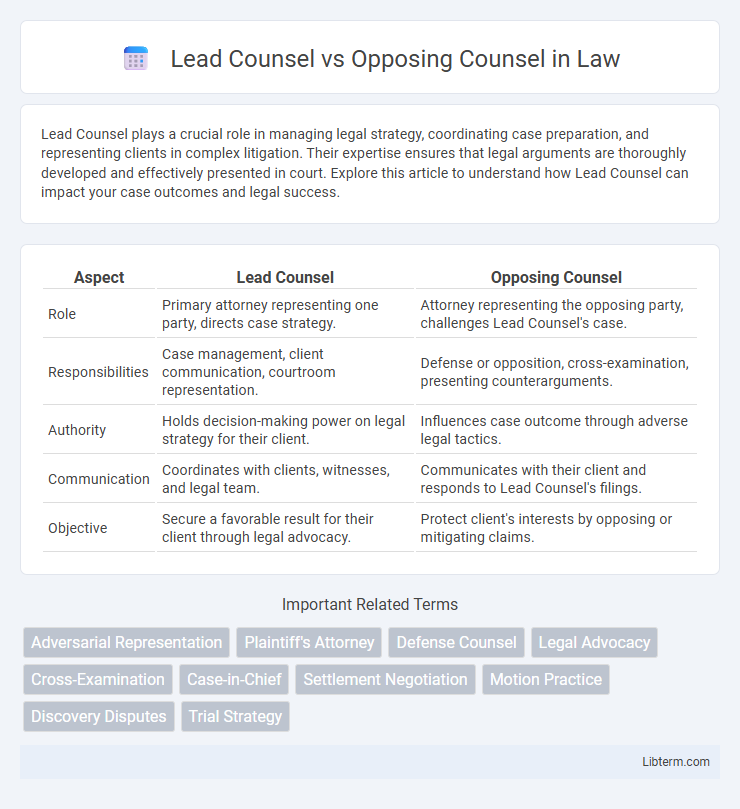Lead Counsel plays a crucial role in managing legal strategy, coordinating case preparation, and representing clients in complex litigation. Their expertise ensures that legal arguments are thoroughly developed and effectively presented in court. Explore this article to understand how Lead Counsel can impact your case outcomes and legal success.
Table of Comparison
| Aspect | Lead Counsel | Opposing Counsel |
|---|---|---|
| Role | Primary attorney representing one party, directs case strategy. | Attorney representing the opposing party, challenges Lead Counsel's case. |
| Responsibilities | Case management, client communication, courtroom representation. | Defense or opposition, cross-examination, presenting counterarguments. |
| Authority | Holds decision-making power on legal strategy for their client. | Influences case outcome through adverse legal tactics. |
| Communication | Coordinates with clients, witnesses, and legal team. | Communicates with their client and responds to Lead Counsel's filings. |
| Objective | Secure a favorable result for their client through legal advocacy. | Protect client's interests by opposing or mitigating claims. |
Introduction to Lead Counsel and Opposing Counsel
Lead counsel serves as the primary attorney responsible for managing a legal case, coordinating strategy, and representing the client's main interests in court. Opposing counsel refers to the attorney or legal team representing the adverse party, tasked with challenging the lead counsel's arguments and protecting their client's position. Understanding the roles of lead counsel and opposing counsel is crucial for effective courtroom litigation and negotiation.
Defining the Roles: Lead Counsel vs Opposing Counsel
Lead Counsel serves as the primary attorney managing a legal case, responsible for strategy, client communication, and courtroom presentation, while Opposing Counsel represents the adversary party, tasked with challenging claims and defending interests. The distinct roles require Lead Counsel to drive case direction and Opposing Counsel to counteract legal arguments through evidence and objections. Understanding these roles ensures clarity in litigation dynamics and promotes effective advocacy on both sides.
Key Responsibilities of Lead Counsel
Lead Counsel holds primary responsibility for developing case strategy, managing the legal team, and coordinating all aspects of litigation to ensure a unified approach. This role involves overseeing discovery, preparing key pleadings, and representing the client in critical negotiations and court appearances. Lead Counsel also assesses risks, advises clients on legal options, and ensures compliance with procedural rules throughout the case lifecycle.
Essential Duties of Opposing Counsel
Opposing Counsel holds critical responsibilities in litigation, including zealously advocating for their client while maintaining ethical standards and fairness throughout the legal process. They are tasked with scrutinizing Lead Counsel's arguments, uncovering weaknesses, and presenting compelling counterarguments to protect their client's interests. Ensuring procedural compliance and fostering candor with the court while challenging opposing evidence are essential duties that uphold justice and adversarial balance.
Skills and Qualities: Lead vs Opposing Counsel
Lead Counsel demonstrates exceptional leadership skills, strategic thinking, and in-depth legal expertise to guide the case effectively and coordinate the legal team. Opposing Counsel exhibits strong analytical abilities, persuasive advocacy, and resilience to challenge the Lead Counsel's arguments and protect their client's interests. Both roles require sharp communication, thorough preparation, and adaptability to navigate complex litigation successfully.
Impact on Case Strategy and Outcomes
Lead Counsel shapes the case strategy by directing the legal team, prioritizing evidence, and crafting persuasive arguments that align with the client's objectives. Opposing Counsel's tactics influence the case trajectory by challenging evidence, exploiting legal loopholes, and presenting counter-narratives that test the robustness of Lead Counsel's strategy. The dynamic interaction between Lead Counsel and Opposing Counsel significantly impacts trial outcomes, settlement negotiations, and overall case resolution.
Collaboration and Conflict in Legal Proceedings
Lead Counsel and Opposing Counsel engage in a critical dynamic where collaboration ensures efficient case management while conflict drives rigorous defense and prosecution strategies. Effective communication and mutual respect between lead counsel and opposing counsel facilitate smoother discovery processes, settlement negotiations, and courtroom procedures. The balance between adversarial conflict and professional collaboration ultimately impacts the integrity and outcome of legal proceedings.
Ethical Considerations for Both Counsels
Lead Counsel and Opposing Counsel must adhere to strict ethical standards, including confidentiality, conflict of interest avoidance, and honest communication with the court. Both parties are bound by professional codes such as the ABA Model Rules of Professional Conduct, which emphasize fairness, integrity, and zealous representation without misleading the tribunal. Ethical considerations also require maintaining attorney-client privilege and ensuring that all actions do not compromise the justice process.
Selecting Effective Legal Representation
Selecting effective legal representation involves distinguishing between lead counsel, who spearheads case strategy and communication, and opposing counsel, who advocates for the adversary's interests. Evaluating a lead counsel's expertise, trial experience, and track record in similar cases enhances the probability of favorable outcomes. Understanding opposing counsel's tactics and reputation allows for better preparation and strategic responses during litigation.
Conclusion: Choosing the Right Counsel for Your Case
Selecting the right counsel for your case hinges on the expertise and strategic approach of Lead Counsel versus Opposing Counsel. Lead Counsel typically guides case strategy and client communication, while Opposing Counsel challenges these strategies rigorously. Prioritizing a Lead Counsel with a proven track record in relevant legal domains ensures stronger representation and a higher likelihood of favorable outcomes.
Lead Counsel Infographic

 libterm.com
libterm.com